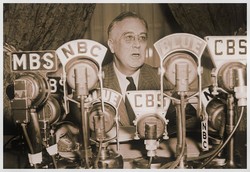Roosevelt And The Depression
|
| updated |
Copy Link Code
|
 Between World War I and World War II, came the Great Depression, an economic declination that began in the United States with a crash of the stock market and spread throughout the world. It began in 1930 and ended during World War II. The Great Depression is a prime example of how low the world economy can go and how vast its effects can be.
Between World War I and World War II, came the Great Depression, an economic declination that began in the United States with a crash of the stock market and spread throughout the world. It began in 1930 and ended during World War II. The Great Depression is a prime example of how low the world economy can go and how vast its effects can be.
Franklin Delano Roosevelt was the president who became the person most responsible for bringing the U.S. through the depression. Within his first few months in office, President Roosevelt took several measures to offset the devastating effects of the depression, and Congress passed hundreds of new laws to promote his efforts. The basis of Roosevelt's depression-ending, New Deal platform was to preserve capitalism and to protect societal institutions in America from disaster. The depression led FDR to focus on restoring the economy from the top down through his own executive orders and legislation that stabilized demand and consumption as they redefined business competition. Some of Roosevelt's initial programs and economic moves were:
- The Agricultural Adjustment Act of 1933 and 1935: One effect of the depression FDR addressed quickly was an oversupply of agricultural products; there was no market for farm products because people had no money. To rectify this problem of the depression, Roosevelt formed The Agricultural Adjustment Act (AAA) of 1933, which was rewritten in 1935 to accommodate some rulings of the Supreme Court. The Act allowed the federal government to pay farmers to "not farm" so the demand would raise the price of farm products. The effect of this legislation proved to be twofold: It promoted the effects of depression, because even more people were plunged into poverty as large farmers dismissed their sharecroppers and tenant farmers, and it brought the imbalance of supply and demand to an end.
- The National Industrial Recovery Act (NIRA) of 1933: Franklin Roosevelt also combated the depression with this Act which served to promote centralized planning as a strategy to prevent unfair business practices; no longer would big business be able to smother out the smaller businesses. Without this stabilization, unemployment would continue to rise as the customer base dwindled, and the prices of goods would be lowered.
- Monopoly, Security and wages: President Roosevelt encouraged the government to temporarily disregard anti-monopoly laws and to support what amounted to price control. At the same time, FDR curbed depression by stabilizing wages, particularly those in industry. In 1935, the Social Security Act was passed which provided some income for older workers which boosted consumer spending.
- The Public Works Administration (PWA) : As a means of further stalling the effects of the depression, Franklin Roosevelt, through the NIRA, formed another agency which funded public employment as a means of creating customer demand; the more people who had jobs, the more they could spend. While this form of job creation didn't provide a huge impact on the economy, it was an effective means of offsetting the depression.
- The Tennessee Valley Authority (TVA) : The creation of this agency was the most effective measure generated by Roosevelt in the Great Depression, because it provided good paying jobs for rural Southern areas in the Tennessee Valley and it brought about modern utility services to a remote region of the U.S. With the millions of dollars allocated to this authority, workers constructed electric power plants, built dams and instituted means of controlling soil erosion.
Other measures FDR used during the depression included the Works Progress Administration, another large federally funded jobs program that provided employment for thousands of workers and the National Labor Relations Act of 1935 to protect unions and guarantee workers a good wage. The effects of the NLRA were immediate; wages increased and consumer spending escalated. President Franklin Roosevelt had taken measures to help the country move through the Great Depression.
For more information, visit http://great-depression-facts.com/
